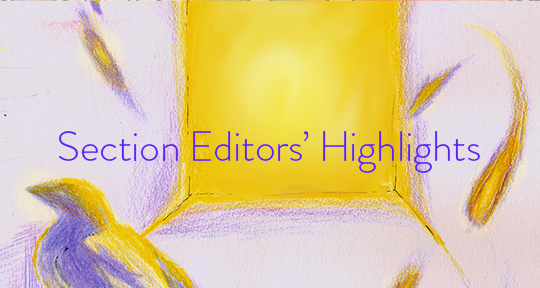Our Winter 2021 issue marks a decade of diving into the languages of the world (our archive now boasts 113 of them!) in all their incredible singularity and variegation. Spanning thirty-one countries, this milestone edition feels like a fitting way to honor a decade of hard work behind the scenes. After hearing from our blog editors last week, let’s pass the mic to the very editors who had a hand in putting together the issue itself.
“Is it a Comedy? Is it a Tragedy?” Thomas Bernhard asks in our debut issue from January 2011. Ten years later, Brazilian author Adelice Souza’s fever-dream of a story (in Padma Viswanathan’s pitch-perfect translation) provides a direct enjoinder: “The play wasn’t a comedy, nor was it a tragedy . . . It was a drama very specifically for those two women.” Just as in Bernhard’s story, the point is not the play at all—we hardly know what the play is about, other than the fact that its two actresses play a lonely woman and her dog, and that tragedy ensues when one demands to switch roles with the other. In contrast to Bernhard, who focuses squarely on the theatre-goer, Souza makes it all about the two actresses whose eight years of traveling with the play to multiple cities have “put them through every type of relationship.” It’s not a story one imagines being plotted out; rather, the work feels like it has been ejected, like toothpaste from a tube, sentence by exhilarating sentence. In the “Brave New World Literature” Special Feature, we also come full circle but in a different way via the return of frequent contributor Jeremy Tiang, who debuted as a translator in our first issue. Combining pop-cultural references with theory, “The World Is Not Enough” is full of quotable gems, but nowhere is Tiang more on-point than when he muses, “Perhaps if the dominant anglophone culture actually acknowledged itself to be part of the world, rather than treating ‘world literature’ as a spice rack to save itself from total blandness, more than three percent of books published in the United States would be in translation?” Finally, anyone who is curious about the workings of a magazine of world literature other than our own will find plenty of food for thought in John Freeman’s riveting piece on how he remade Granta into a global publication.
—Lee Yew Leong, Fiction Editor and ”Brave New World Literature“ Special Feature Editor
Max Rojas is a constant enthusiasm of mine and so I was thrilled to showcase a pretty sizable excerpt from Zane Koss and Gerónimo Sarmiento Cruz’s translation—the very first in English—in all its shining, breathless glory. Even though it’s a mere sliver of a doorstop-sized poem, it’s an excellent sample of Rojas’ talent and an overdue introduction for the Anglosphere. The language of Bodies is both baroque and ephemeral, rugged and philosophical, and its tone swings between that of a theologico-political treatise and a declaration of war. It’s some of this last century’s densest and most sophisticated Spanish-language verse, and some of the most woefully unknown.
—Garrett Phelps, Poetry Editor READ MORE…


